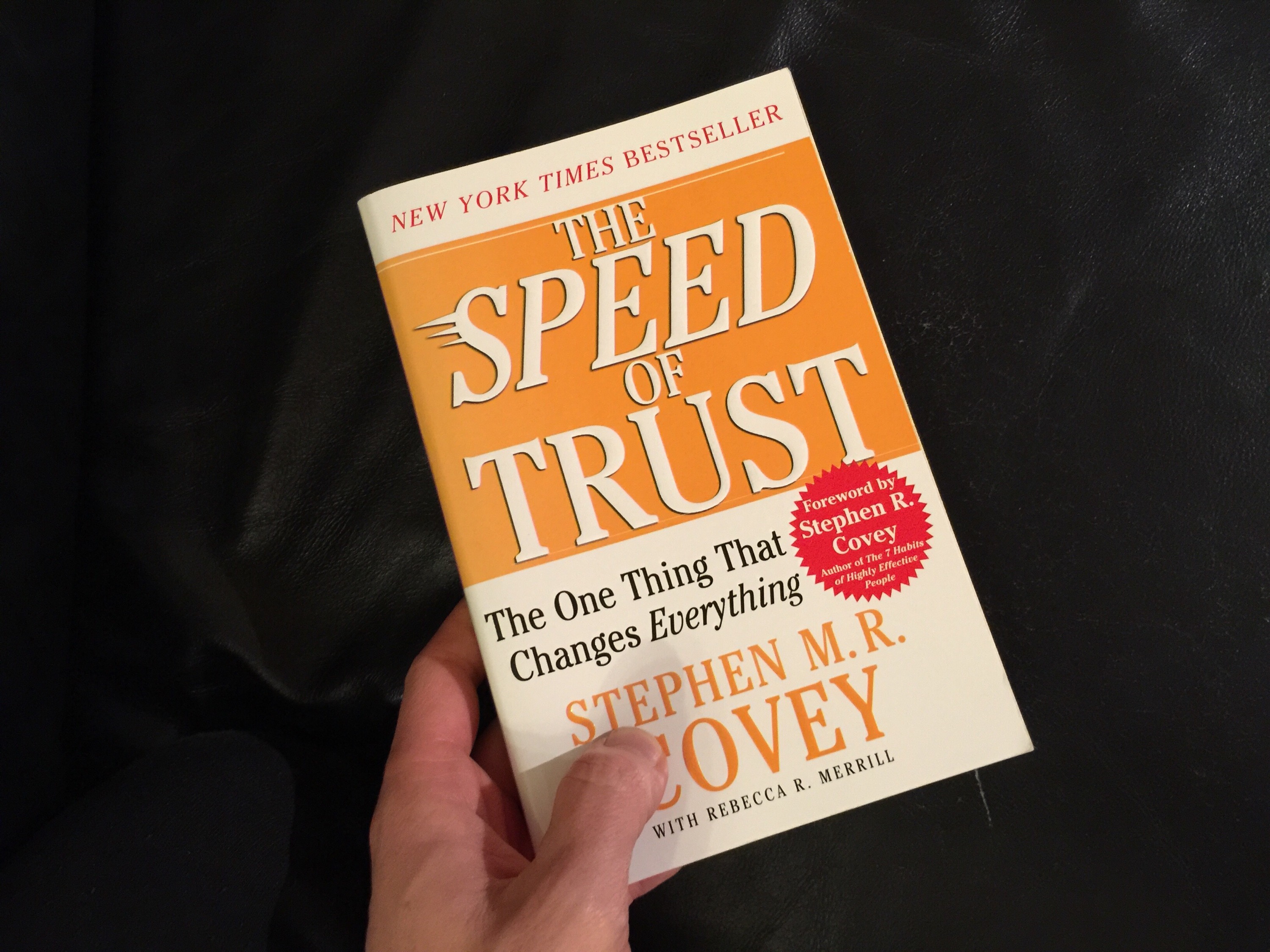Book notes on The Speed of Trust: The One Thing That Changes Everything by Stephen M.R. Covey
Book about impact of trust with respect to costs and ability to get things done. Tools on establishing trust, finding right language to use, noting behaviours that exhibit and build trust.
Trust = Confidence; mistrust = suspicion
Increased trust – increased speed and decreased cost (decreased trust = decreased speed and increased cost)
Low trust tax vx high trust dividend
Trust is the hidden variable which affects organizational success.
Dividends of high trust: effortless communication, high collaboration, transparent relationships, strong innovation.
Trust is a function of character and competence. It can be restored in most cases of lost. Trust can be taught, learned, and it can become a leveragable, strategic advantage. Establishing trust with one establishes trust with many.
People want to be trusted and they thrive on trust. Get good at extending, establishing, and restoring trust. It’s the most effective way to get results and relate to and work with others.
Trust is function of two things: character (integrity, motive, intent) and competence (capabilities, skills, results).
5 Waves of Trust – metaphor for ripple effect of trust extending outward starting with
Self Trust -> Relationship Trust -> Organizational Trust -> Market Trust -> Social Trust
Self Trust or belief/confidence in self. Idea is to become a person you and others can trust based on credibility.
5 cores: integrity (honesty), intent (motives, agenda, resulting behaviour), capabilities/credentials (talents, attitudes, skill, knowledge), track record;
high importance in trusting in oneself.
Integrity – cool story re Andy Roddick who had a match point in his favour with opponent serving. The opponent served and the line judge called it out, meaning Andy had just won the match. Andy looked at the court and told the umpire that the line judge was incorrect, the serve was in and Andy lost the point. Andy ended up losing the match.
Intent
– intent matters
– it grows out of character
– we judge ourselves by our intent but we judge others by their behaviour (be mindful of bad execution of good intent)
– we tend to judge others’ intent based on our own paradigms and experiences
– distrust sometimes originates because of conclusions drawn about what is being done therefore it is important to declare intent to actively influence conclusions others draw
Capabilities – talents, attitudes, skills, knowledge, capacities, abilities, and style allowing for excellent performance
Results – results matter. What results matters as much as how the results are obtained. Defining results, you won’t always win so take lessons/results from losses too.
Communicating results – In creating credibility with others it’s not (only) the results that count, it’s people’s awareness of the results. It is therefore important to be able to communicate results to others.
How to improve results:
- take responsibility for results (not just activities that could, but may not, lead to results); focusing on achieving results not just doing things unleashes creativity
- expect to win
- finish strong / push through; Results are all about finishing; “Beginners are many; finishers are few.”
Relationship Trust or establishing trust we have with others through consistent behaviour.
Behavior matters; what you do has a greater impact than what you say. Good words matter as they signal behavior and create intent. “Trust is established through action”
13 Behaviors of trust– all require combination of character and competence. It’s possible to take the behaviours to the extreme. Any strength pushed to the extreme (can) becomes a weakness.
- Talk Straight; tell the truth and leave the right impression. (when taken too far becomes brutal and cruel in communication)
- Demonstrate Respect
- Create Transparency
- Right Wrongs
- Show Loyalty / Give Credit Freely
- Deliver Results
- Get Better
- Confront Reality – take issues head on, even the “undiscussables”
- Clarify Expectations
- Practice Accountability – hold yourself and others accountable
- Listen First
- Keep Commitments
- Extend Trust
Organizational Trust; how leaders can generate trust; establishing structures, systems, and symbols that are aligned appropriately to help establish trust.
High trust: Shared information, mistakes and learning encouraged, innovation, creativity, loyalty to others, collaboration, sharing of credit, high degree of accountability
Market Trust; underlying principle if reputation; creating brand loyalty and affecting customer behaviour. Brand matters on every level. Personal brand also determines if you are given the benefit of the doubt.
Social Trust; creating value for others, contributing, giving back.
“It is equally an error to trust all men or no men: -Latin proverb (re: extending trust)
Extend smart trust by using good judgement/ analysis based on opportunity, risk, and credibility. “Trust, but verify” -Ronald Regan
“Best time to plant a tree is twenty years ago. Second best time is today” -Chinese proverb
